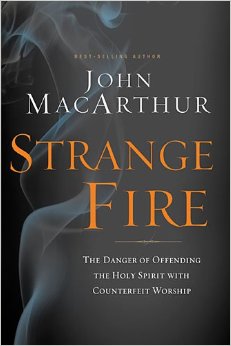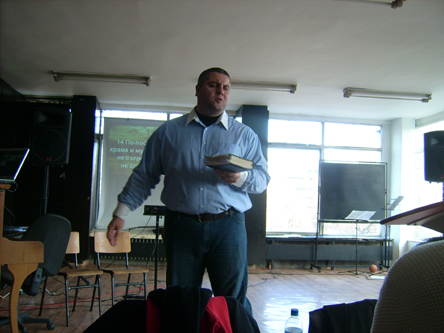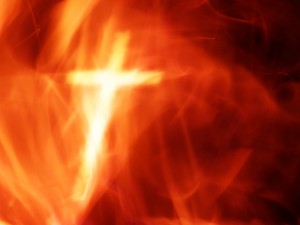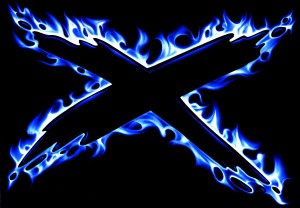Are Pentecostals offering Strange Fire?
Comments Off on Are Pentecostals offering Strange Fire?
 Did tongues and the supernatural gifts of the Holy Spirit cease in the early church? John MacArthur says they did and that practicing them today is false worship—an abomination before God. Pneuma Review invites you to respond to these criticisms and to renew the biblical command to “desire spiritual gifts” (1 Cor 14:1).
Did tongues and the supernatural gifts of the Holy Spirit cease in the early church? John MacArthur says they did and that practicing them today is false worship—an abomination before God. Pneuma Review invites you to respond to these criticisms and to renew the biblical command to “desire spiritual gifts” (1 Cor 14:1).
We’ve been here before
In 1978, MacArthur wrote The Charismatics: A Doctrinal Perspective (Zondervan). Charismatic Chaos (Zondervan) was published in 1992. Dr. MacArthur launched his latest attacks against Pentecostal/charismatic beliefs with the Strange Fire conference (October 16-18, 2013), with speakers including Joni Eareckson-Tada and R. C. Sproul. His new book is Strange Fire: The Danger of Offending the Holy Spirit with Counterfeit Worship (Thomas Nelson), due out on November 12, 2013.
Not known for a conciliatory approach, John MacArthur’s inflammatory language is sure to polarize any attempt by Christians to discuss the gifts of the Spirit. We all agree that spiritual gifts can be and have been misused. There are significant doctrinal errors and poor theology being taught by some Christian leaders today. But are all Pentecostal/charismatics worshiping God falsely? Are they believing and teaching a counterfeit Gospel?
Invitation to participate
Pneuma Review has invited Pentecostal/charismatic scholars and Bible teachers from around the world to read and respond to MacArthur’s book. This is your opportunity to join the discussion about the continuation or cessation of the gifts of the Holy Spirit.
Use the Comment box below so that all of us may read your posts.
As we have this needed conversation
Please keep in mind the Pneuma Foundation’s (parent organization of Pneuma Review) principles for discussing controversial topics.
When presenting teachings over which there is disagreement in the body of Christ, the Pneuma Foundation will not make its position in a manner that alienates or ignores opposing views. It is better to follow the Biblical mandate of preferring others over ourselves (Phil. 2:3-4). The Foundation desires to present the differing viewpoints and promote dialogue, acknowledging that the goal of our instruction is love (1 Tim. 1:5).
Pentecostals too?
Is John MacArthur being as hard on Pentecostals as he is on charismatics? This brief video by MacArthur might make you think that he is more sympathetic towards classical Pentecostals. However, Dr. Michael Brown sent this note to us that he posted on his Facebook page:
For all those writing to me and claiming that Pastor MacArthur is reaching out to “faithful Pentecostals” in a conciliatory way, make no mistake about it: He renounces the entire charismatic movement as being in serious error and ends his book with a strong appeal to his reformed charismatic friends to completely renounce their beliefs in continuationism. It’s black and white, in his book, on my desk, no doubt about it.
John MacArthur’s Strange Fire, Reviewed by R. Loren Sandford
 Strange Fire by John MacArthur is basically an attack on anything and everything related to the Charismatic Movement and the various movements descended from it, as if the whole of it were composed of one monolithic set of doctrines and practices that all of us espouse. It invalidates anything that smacks of the supernatural or of emotion freely expressed in God’s presence. MacArthur pours his vitriol – and I mean vitriol – through the filter of his own prejudices and theological presuppositions in a way that blinds him to the differences between the various movements within the charismatic stream and causes him to deny the existence of the majority of us who do not agree with or practice the abuses he objects to. In doing so he ignores or reinterprets, through very poor exegesis, the clear teaching of much of the Scripture as well. [Read more]
Strange Fire by John MacArthur is basically an attack on anything and everything related to the Charismatic Movement and the various movements descended from it, as if the whole of it were composed of one monolithic set of doctrines and practices that all of us espouse. It invalidates anything that smacks of the supernatural or of emotion freely expressed in God’s presence. MacArthur pours his vitriol – and I mean vitriol – through the filter of his own prejudices and theological presuppositions in a way that blinds him to the differences between the various movements within the charismatic stream and causes him to deny the existence of the majority of us who do not agree with or practice the abuses he objects to. In doing so he ignores or reinterprets, through very poor exegesis, the clear teaching of much of the Scripture as well. [Read more]
John MacArthur’s Strange Fire, Reviewed by Eddie L. Hyatt
![hyatt_1-140x205[1]](http://pneumareview.com/wp-content/uploads/2013/10/hyatt_1-140x2051.gif) As a life-long Pentecostal-Charismatic, I recommend that every Pentecostal-Charismatic leader read Strange Fire by John MacArthur. I say this because we need to see how the bizarre “spiritual” behavior and doctrinal extremes by some in our movement are viewed by those on the outside and are used to whitewash the entire movement. We have done a very poor job of addressing these problems from within, so I do not doubt that God has raised up a voice that is fundamentally opposed to our movement to address these extremes. If God could use a pagan Babylonian king to discipline his people Israel for their sins (Jeremiah 25:8-11), could he not use a merciless fundamentalist preacher to point out our shortcomings? [Read more]
As a life-long Pentecostal-Charismatic, I recommend that every Pentecostal-Charismatic leader read Strange Fire by John MacArthur. I say this because we need to see how the bizarre “spiritual” behavior and doctrinal extremes by some in our movement are viewed by those on the outside and are used to whitewash the entire movement. We have done a very poor job of addressing these problems from within, so I do not doubt that God has raised up a voice that is fundamentally opposed to our movement to address these extremes. If God could use a pagan Babylonian king to discipline his people Israel for their sins (Jeremiah 25:8-11), could he not use a merciless fundamentalist preacher to point out our shortcomings? [Read more]
MORE on the TOPIC:
Tim Challies: Lessons Learned at Strange Fire
Adrian Warnock: Strange Fire – A Charismatic Response to John MacArthur
ALEX MURASHKO: MacArthur Continues Case Against Charismatic Movement at ‘Strange Fire’
Alan Smith: SOME THOUGHTS IN RESPONSE TO THE STRANGE FIRE CONTROVERSY
SAMUEL RODRIGUEZ: John MacArthur Suffers From Spiritual, Cultural and Theological Myopia
Joela Barker: A Response to John MacArthur’s Strange Fire Conference
MICHAEL BROWN: A Final Appeal to Pastor MacArthur on the Eve of His ‘Strange Fire’ Conference
Sarah Pulliam Bailey: John MacArthur vs. Mark Driscoll: Megachurch pastors clash
Benjamin Robinson: Strange Fire? A Response to John MacArthur
CREDO HOUSE: WHY JOHN MACARTHUR MAY BE LOSING HIS VOICE
The Fire Bible Review
Several months ago, our team undertook the task of comparing and reviewing a growing number of Study Bibles appearing on the book market recently in what we called a 21st century Revival of Study Bibles. This article is part of our Study Bibles review series as outlined here: https://cupandcross.com/bible-revival/
Fire Bible Review
Dony K. Donev, D.Min.
I’ve been personally following and using the Fire Bible since it was called the Full Life Study Bible. And not mainly because it is Pentecostal (much like Dake’s and Spirit Filled Life Bibles), but more so because a good portion of the commentaries were written by one of my favorite professors in seminary, Dr. French Arrington. Therefore, I was very truly blessed when our ministry was able to participate in the translation and promoting this great work in Bulgaria.
Beginning with our usual control passages from the Old Testament, Number 6 contains a great detail of explanation on the vow and practice of the Nazarite law. Furthermore, there is a special note on “Wine in the Old Testament” in the Fire Bible, and the Aaronic benediction at the end of the chapter is specifically marked, outlined and discussed as two articles are cited in connection with “Faith and Grace” and “The Peace of God.”
Our second control passage in Jeremiah 18 is also not left without discussion. Actually, the commentary in v.8 makes two powerful points on God taking account spiritual changes in our lives and not forcing our decision despite knowing the final outcome; thus presenting a typical Pentecostal approach on free will, God’s sovereignty and foreknowledge, which is further discussed in the article on “Election and Predestination.”
The doctrine of the Rapture is not only mentioned in Revelation 4, but preceded with a special article from 1 Thessalonians and a detailed chart of Last Day Events in the forward of Revelation in both the early and the Fire editions. The Tribulation is also clearly explained as a post-Rapture event, divided in two parts and well documented with Scripture references. Additionally, in a very balanced Pentecostal manner, the dispensations, although noted by some, are not explicitly defended in the pre-Millennial system. The significance of the phrase “in the Spirit” is dully noted, which brings us to Pneumatology.
In regards to Pentecostal theology, the doctrine of Trinity is presented in an indictable orthodox way after the Athanasius Confession. Perhaps, the only criticism could be that there’s no mention of the fact that some early Pentecostal groups indeed taught Jesus-only doctrine. The Holy Ghost baptism is both theoretically and practically explained in the forward to Acts, while there’s an additional article on Speaking in Tongues after Acts ch.2. This is further mentioned in a comment after Mark ch. 16 followed by an article on Spiritual Gifts in 1 Corinthians 12.
There’s also a detail discussion the doctrine of Sanctification in 1 Peter after the foreknowledge of God is additionally explained. Sanctification is viewed as immediate, not “giving up sin little by little,” yet “do not suggest an absolute perfection.” The work of God and man is defined, and most importantly God is viewed as one who desires to sanctify His people. There’s no specific comparison to a second work of grace, yet the general approach toward the doctrine and practice of sanctification presents a typical, historically accurate, Pentecostal point of view toward the teaching.
Fire from Heaven
![fire-from-heaven[1]](https://cupandcross.com/wp-content/uploads/2013/06/fire-from-heaven1.jpg) In 1965, Dr. Harvey Cox wrote a book entitled The Secular City, as an attempt to offer a theology for the age of coming postmodernism. In it, he regarded rapid urbanization and cultural deconstruction as challenges that demand answers from 20th century Christianity.
In 1965, Dr. Harvey Cox wrote a book entitled The Secular City, as an attempt to offer a theology for the age of coming postmodernism. In it, he regarded rapid urbanization and cultural deconstruction as challenges that demand answers from 20th century Christianity.
But in the mid-1990s, Cox wrote another book entitled Fire from Heaven, which served as a response to some of the questions raised previously in The Secular City. The new research suggested the rapidly growing Pentecostal movement as the answer to the postmodern quest for religion and spirituality. As such, Pentecostalism represented the process of spiritual restoration of significance and purpose to oppose despair and hopelessness (p. 33). The book further proposed that Pentecostalism in global perspective is a solution to the modern-day Christianity crisis.
Formative Context
The research begins at the turn of the twentieth century with the American context as the original formative environment for modern-day Pentecostalism (chapter one). Since the time was a peak for millennial expectations and holiness quests, a second Pentecost was a natural culmination. The factors that presupposed the Pentecostal movement are then used to provide further proof for the success of Pentecostalism as religious and social reformation. Since, this is not constrained geographically to its roots and tradition, a global impact Christianity is possible.
Pentecostal Beginnings
After establishing the contextual formative factors of modern-day Pentecostalism, Fire from Heaven considers its beginning at the Azusa Street revival. The research describes it as a revolutionary event of social reformation of classes, genders and races which did not just spark Pentecost but aided its spread in America. The focus on William Seymour is well deserved, since the Azusa Street events were the end of a long formative process through which Pentecostalism emerged. On the other hand, Los Angelis in the beginning of the 20th century was not only a proper social context for such event, but also provided the right medium through which this event could spread nationally. This is the difference between Pentecostal historians who see a heritage of historical developments that lead to modern-day Pentecost, and commentators outside Pentecostalism who only have a glimpse of the largely publicized events and accounts.
Pentecostal Growth
One aspect of Pentecost, which seems central for the research, is its power to influence and grow. Fire from Heaven gives a brief account of modern Pentecostal history in regard to the global growth and increasing influence of the movement. The interesting aspect in the approach is that the author is an outsider in regard to Pentecostalism and observes the historical developments as cause and effect processes, rather than personal heritage. Yet, even with such an approach, Pentecostalism becomes a personal experience for the author which he uses as a proof for his thesis. Cox admits that the rapid growth of Pentecostalism is not an accidental event, but it is supported by the fact that this particular religious movement is able to provide applicable answers to religious quests and crises and thus serves as a movement for social transformation. This research finds the power of Pentecostalism in its simple but applicable message.
Toward Pentecostal Theology of Experience
The heart of Fire from Heaven is the proposal of three major primitive developments that have been attributed to the Pentecostal message: primal piety, primal speech and primal hope (p. 82). These are easily identified in Pentecostal circles as holiness, glossolalia and eschatological hope. Of great interest to the Pentecostal believer are the associations which Fire From Heaven offered. For example, the sign of speaking in tongues expresses the Pentecostal appeal for interdenominational union and racial equality which serves as a restorational factor for the original creation and order before the division at the Tower of Babel.
Furthermore, this story of Pentecostalism proposed that miracles and wonders were not connected to power alone. Instead, they were the results of piety and holiness of both the individual Christian and the ecclesial community. Finally, the recovery of the first hope became the answer for the present quest for existence. As such, the eschatological return of Christ for judgment over all and to restore the creation to its original order became the motivation and meaning for the Pentecostal Christian in the present life.
Pentecostalism in a Global Context
Another Biblical practice applied by early Pentecostals was evangelization with special interest to its global aspect of missions. Chapters 7-12 of Fire from Heaven deals with the global spread of Pentecostalism as a religious movement that was able to respond equality in different cultural contexts. Cox uses chapters seven and eight to show that Pentecostalism approached the 20th century world not only as a religious movement, but as a social one as well. Modern-day issues like the role of women, music, etc., which were coherent factors in the world’s 20th century history, were viewed and addressed by Pentecostals as well.
Chapters nine through twelve are Cox’s personal observations and evaluation of Pentecostal worship praxis in Pentecostal churches around the world. Unfortunately, European Pentecostal churches are not a part of this in-depth analysis, which limits the global overview of the research. The mentioned examples, however, give enough material to show Pentecostal characteristics, approaches and reasons why more and more people join this movement. The book finishes with a return to American Pentecostalism and its effect on present American spirituality as well as cultural and social developments.
Mission Applications
The above book review agreed with my understanding and practice of Pentecostal theology since I have learned and lived it in the underground Bulgarian Church of God. As I read the pages of Fire from Heaven, I began to feel that something had been lost since the time when modern Pentecost began. The twenty first century Christianity offers everything except the primitivism, purity and power of its own Holiness roots. My visit with Dr. Cox at Harvard Divinity School in the summer of 2000 not only served as a proof for me, but it provided the groundwork for the writing of my masters thesis on the subject of “Pentecostal Primitivism Preserved.”
The central theme of my research was an appeal for remembering and returning to the past. Based on my own Eastern Pentecostal tradition and personal salvific experience, my paper went a step further than Dr. Cox’s Fire from Heaven and called the Christian Church to neo-primitivism as expressed in the rediscovering and reclaiming of the basic order of the Primitive Church of the first century. Additionally, my master’s thesis reformulated the three primal distinctives of the Pentecostal experience as power, prayer and praxis. Finally, the paper called for a reclaiming of the original experience as the answer for the church of the 21st century, but only when expressed in discipleship after the example of Christ. The conclusion pointed out that only through such process would the Pentecostal community be enabled to preserve its own identity and transmit the faith once delivered to the saints of the future generations.
We have used this approach in the mission work in Bulgaria for the past few years and it has proven to be an effective Biblical strategy for missions. While it is yet a bit early to speak of its successes and failures, I might add that its practical implementations have gained a large interest among ministers and the membership of the Bulgarian Church of God. Since the fall of the Berlin Wall, the political and economical challenges in Eastern Europe have strongly affected the Evangelical Churches in Bulgaria. As the Protestant Church in Bulgaria is entering a new constitutional era in the history of the country, more than ever before, reformation in doctrines and praxes is necessary in order to adjust to a style of worship liberated from the dictatorship of the communist regime is needed. Fire from Heaven is an encouragement that Pentecostalism as a church model and social-religious formative process is the answer for contexts equal to the present Bulgarian reality.
Fire in the Temple 2010
Ministering at the Fire Church of God in Sofia
 Returning to minster at the Fire Church of God in Sofia was a special event for our team. Many of the members there, as well as the pastor’s family, have been friends of ours and pastors in the ministry for a long time now. We have worked with Church of God Sofia regional overseer, Daniel Kirov and his team since 2002 when he first moved to Sofia with a vision to plant a church. Since then, his vision has become a reality in the capital as the Fire Church of God is one of the few active Church of God congregations in the largest metropolitan area in Bulgaria.
Returning to minster at the Fire Church of God in Sofia was a special event for our team. Many of the members there, as well as the pastor’s family, have been friends of ours and pastors in the ministry for a long time now. We have worked with Church of God Sofia regional overseer, Daniel Kirov and his team since 2002 when he first moved to Sofia with a vision to plant a church. Since then, his vision has become a reality in the capital as the Fire Church of God is one of the few active Church of God congregations in the largest metropolitan area in Bulgaria.
This time, we were able to focus on the new Bulgarian translation of the Bible, which we have now prepared for print, and present to the congregation an interactive Bible study from the Gospel of John. It was encouraging again to watch the small, but growing congregation, interpret the Bible corporately in a Bible study that enlightens the mind and transforms the soul. It was the way the Bible was intended to be read and interpreted, understood and lived – among true brothers and sisters.
Fresh Revival Fire in Yambol
 After the storm in Plovdiv quieted down some, our team returned to one of our bases in the city Yambol for a special service with Bulgarian Church of God Roma Bishop Iliya Panov. As his praise band from Sofia’s Life Church of God worshiped the Lord and ministered the Word, the Holy Spirit fell with power over the Yambol congregation. Some hundred people came to the altars raising their hands toward the heavens, crying and praying. They pleaded with God for a spiritual revival in a way that we have not seen in Bulgaria since the early 1990s.
After the storm in Plovdiv quieted down some, our team returned to one of our bases in the city Yambol for a special service with Bulgarian Church of God Roma Bishop Iliya Panov. As his praise band from Sofia’s Life Church of God worshiped the Lord and ministered the Word, the Holy Spirit fell with power over the Yambol congregation. Some hundred people came to the altars raising their hands toward the heavens, crying and praying. They pleaded with God for a spiritual revival in a way that we have not seen in Bulgaria since the early 1990s.
While this mighty move of the Spirit was literally being absorbed by the people, the director of our regional ministries gave a call for prayer for the baptism with the Holy Ghost. Immediately, prayer groups were formed around the people who raised their hands for prayer and only minutes later several received the baptism and were speaking in heavenly languages. People were crying and praying all over the church house now transformed in a heavenly sanctuary by the presence of the Holy God. A lady with a spiritual gift reported seeing a vision of the Holy Spirit descending as a cloud over the church during the service.
* * *
We realize while writing these words how close they sound to the reports of the Azusa street revival from the beginning of the 20thcentury. And having seen the power of God moving through churches and people all across the country of Bulgaria, we cannot remain silent any more. We must testify what our eyes have beheld, that we have seen the glory of God and He is doing a new thing in Bulgaria again.
Blue Fire
This past weekend while camping on top of the mountain of Petrohan with fellow believers, the Lord displayed his glory in many unique manifestations. Some people were baptized in the Spirit, while others received a fresh blessing with new direction for their lives. Many more were healed instantaneously, as the Lord’s presence was both glorious and gentle remaining with us throughout the night.
Saturday evening, while in prayer around one of the torches which surrounded the perimeter of the tents, the Lord revealed to me in an ever peaceful way that we are to be “Blue Fire”.
The blue fire is the part of the flame which one does not really consider when thinking about a flame. It is the element, which is at the base of the flame burning closest to the source. Therefore, the blue fire is the part with the most oxygen which allows for complete combustion. It is in this state, leaving no residue, where the flame is the purest. The blue fire is the hardest to blow out and remains light even in the strongest winds. And despite popular belief, the blue part of the flame, and not the red one, is the hottest part of the fire.
The red flame receives its color from the impurities in the air that are being combusted. These impurities absorb heat and are the cause for the red fire not being as hot as the blue fire. Since the red fire is not hot enough to reach the state of complete combustion not being close enough to the source, it leaves a soot residue, which contaminates its surroundings. And when the wind blows it does not remain strong.
We are not simply to be on fire for God with a red flame, but we are to be on fire for God with a blue flame. We are to be “Blue Fire”. We are to be the hottest and most constant of the fire. And it is in doing this that we provide true light to our surroundings and not residue. We are to remain as hot as blue fire in order to be without impurities, uncontaminated by the world. For it is the blue fire which does not to waiver in the wind; and it is the blue fire which remains as one with the source of the flame.
The Fire Bible in Bulgarian
 Bulgaria, a former communist country in Eastern Europe, is the focus for Bible Sunday 2003 purposing to provide the “Fire Bible” (also known as the “Life in the Spirit Study Bible,” formerly the “Full Life Study Bible”) in the Bulgarian language for pastors and lay workers in that nation of 8 million people. For the past decade and more, a Pentecostal revival has swept Bulgaria. Since 1989 when the communist era ended, the Pentecostal Assemblies of Bulgaria has grown from 35 churches to more than 600. It is the largest Protestant church in the nation! This growth has created a critical shortage of trained leaders. At this time there are only 100 trained leaders to lead the 600 churches. Therefore, deacons and lay workers who have little or no training are serving as pastors. “There are few books available to the Bulgarians to help them become better pastors,” says Kevin Beery, A/G missionary in Bulgaria. “The ‘Fire Bible’ with its Pentecostal study notes, commentary, concordance and many study helps is an all-in-one tool for the pastor who is doing his best to pastor a church without much training.” Kevin and his wife, Wendy, are managing editors for the Bulgarian “Fire Bible” project and have served nearly a decade in Bulgaria.
Bulgaria, a former communist country in Eastern Europe, is the focus for Bible Sunday 2003 purposing to provide the “Fire Bible” (also known as the “Life in the Spirit Study Bible,” formerly the “Full Life Study Bible”) in the Bulgarian language for pastors and lay workers in that nation of 8 million people. For the past decade and more, a Pentecostal revival has swept Bulgaria. Since 1989 when the communist era ended, the Pentecostal Assemblies of Bulgaria has grown from 35 churches to more than 600. It is the largest Protestant church in the nation! This growth has created a critical shortage of trained leaders. At this time there are only 100 trained leaders to lead the 600 churches. Therefore, deacons and lay workers who have little or no training are serving as pastors. “There are few books available to the Bulgarians to help them become better pastors,” says Kevin Beery, A/G missionary in Bulgaria. “The ‘Fire Bible’ with its Pentecostal study notes, commentary, concordance and many study helps is an all-in-one tool for the pastor who is doing his best to pastor a church without much training.” Kevin and his wife, Wendy, are managing editors for the Bulgarian “Fire Bible” project and have served nearly a decade in Bulgaria.









